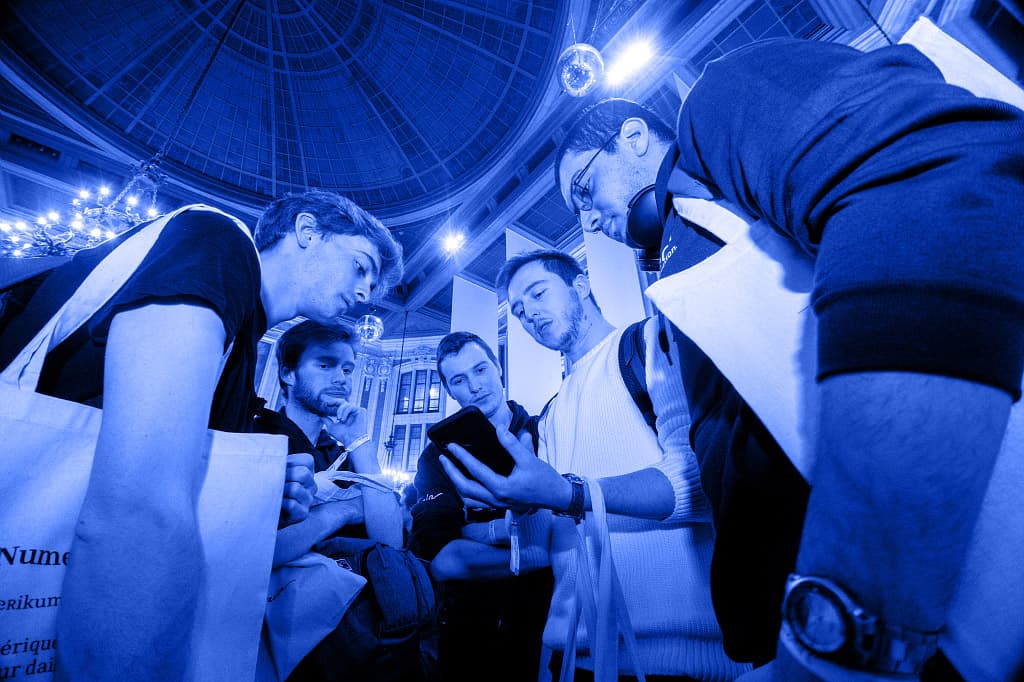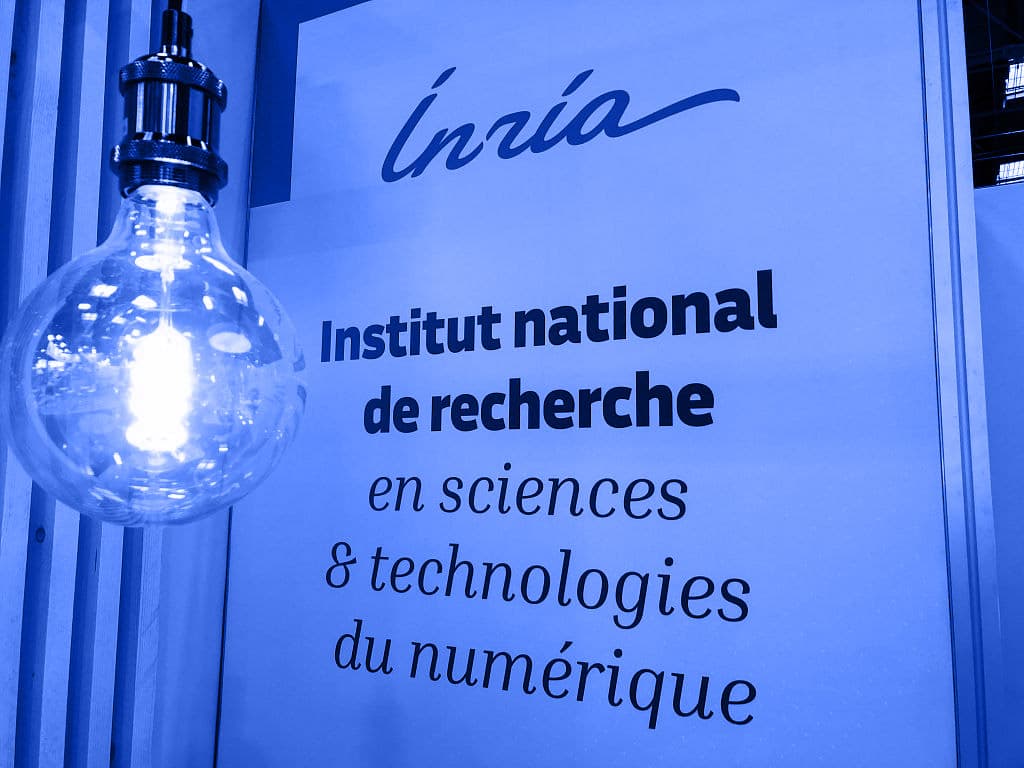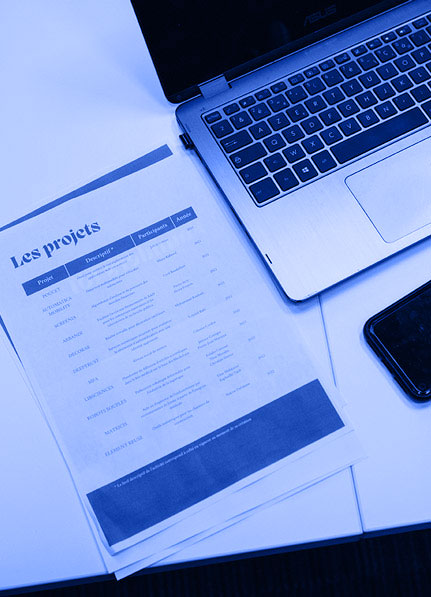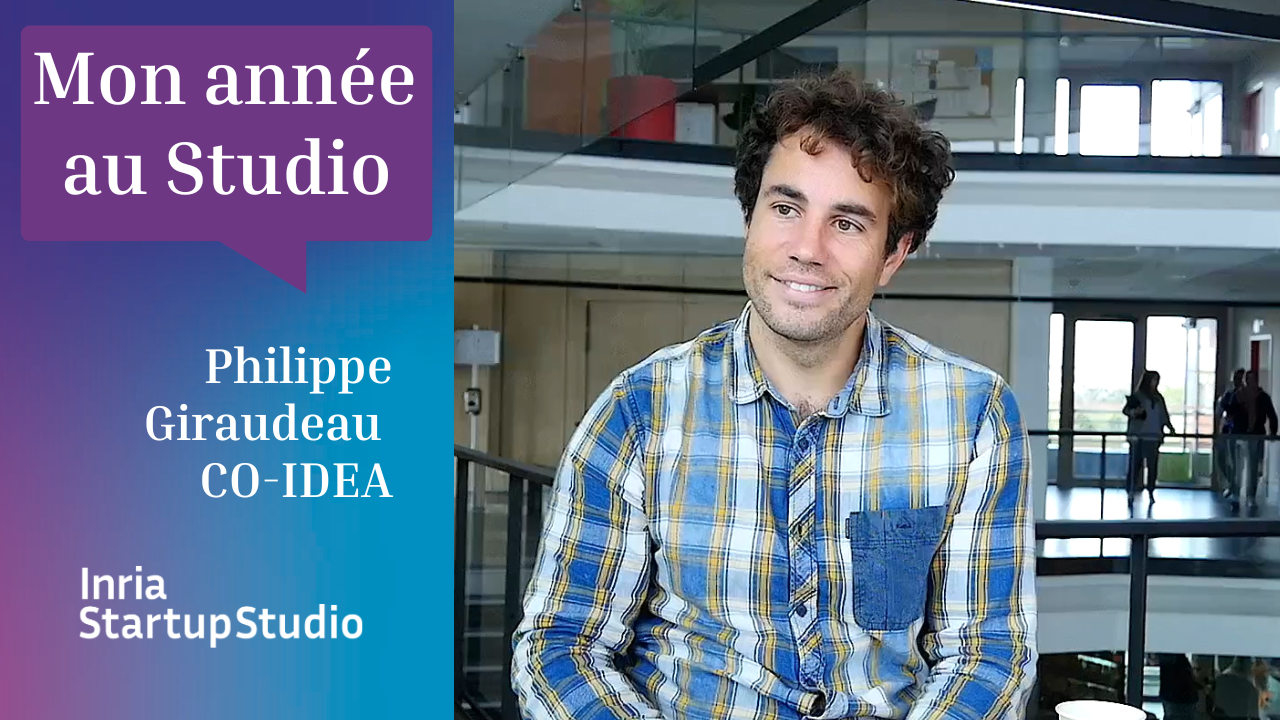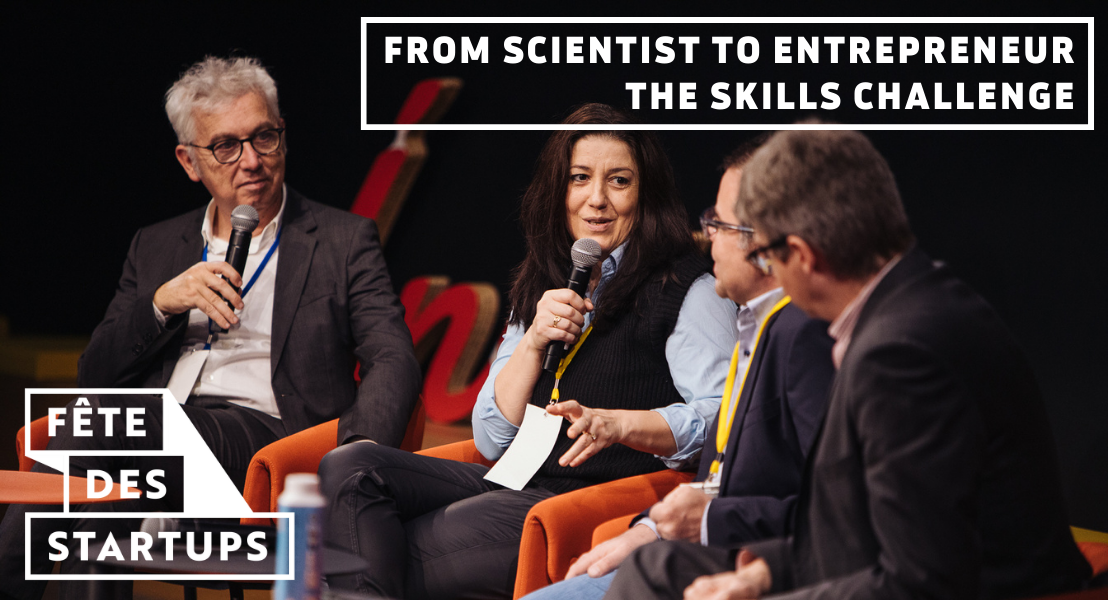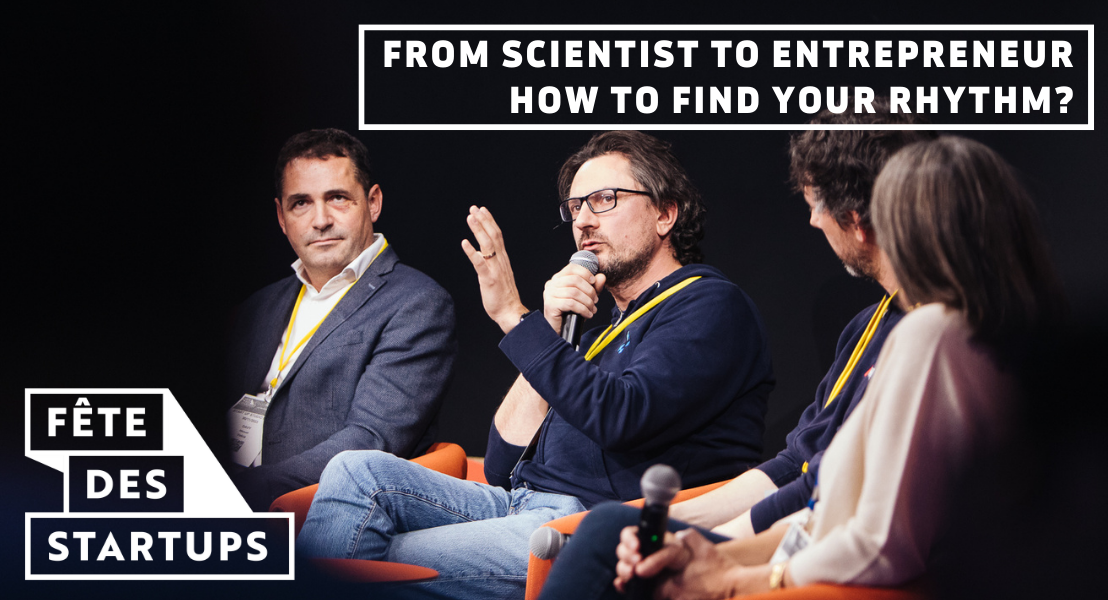
From scientist to entrepreneur: how to find your rhythm?
The Inria Startup Studio Startup Festival explored the transition from research to entrepreneurship around 3 round tables and a keynote. Skills, financing, success or reorientation, these exchanges highlighted the sharing of experience in order to enable entrepreneurs to resolve the challenges linked to the creation of a digital deeptech startup. During this third round table, Emmanuel Vincent, Pierre Fillard, Manuel Davy and Margot Corréard highlight the nuances between the long-term development of innovative solutions and the need to adapt to a rapidly evolving market.
If research and entrepreneurship face the same difficulties in financing themselves and share the same goal, namely finding solutions to everyday problems, they differ significantly in their relationship to time. Explanations with:
- Margot Corréard, co-founder of DiagRams Technologies
- Manuel Davy, founder and CEO of Vekia
- Pierre Fillard, co-founder and CSO of Therapixel
- Emmanuel Vincent, co-founder of Nijta
A temporal challenge
How can we reconcile research work that necessarily takes a long time, and the management of a startup immersed in an ecosystem where everything moves very quickly? It is this difficulty that many project leaders supported each year by Inria Startup Studio face, like Emmanuel Vincent, Research Director at Inria Nancy and Co-founder of Nijta, a startup specializing in voice anonymization: “Initially, we set up a research project with Inria Lille, in order to build an ethical voice assistant that respects privacy.
In 2018, we recruited Brij Srivastava, who was then a doctoral student. After many failures, we were able to achieve a functional solution in 2021, which serves as the basis for Nijta, of which Brij is today the CEO. But looking back, this development seems rather rapid to me, since I see technologies that I worked on twenty years ago which are only just beginning to find markets today!”
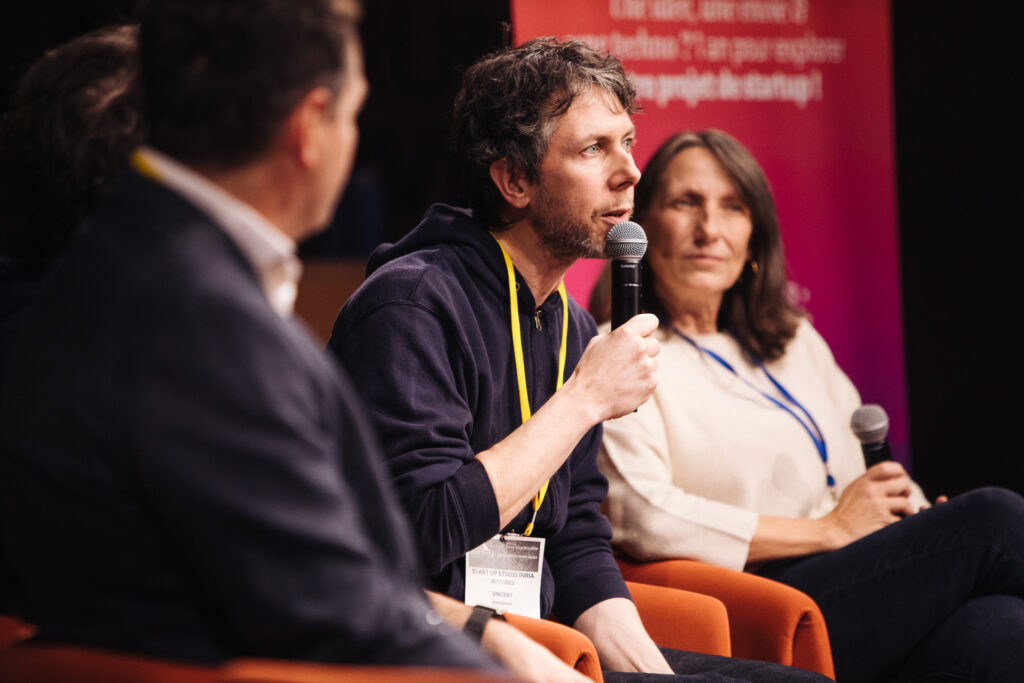
Stay focus
A testimony in which the other entrepreneurs participating in the round table were able to find themselves. Formerly of Inria Saclay, Pierre Fillard is celebrating this year the tenth anniversary of Therapixel, a company of which he is the co-founder and scientific manager, and which has undergone several developments before specializing today in the detection of breast cancer. “Between 2013 and 2017, we developed medical imaging technology that can be used without contact, and therefore during operations in a sterile environment. It’s a very long development, especially in the medical sector, where nothing is left to chance. In 2017, we had the opportunity to participate in competitions focused on the detection of breast and colon cancers. Winning the first pushed us to pivot, while our technology responded to a major problem: out of 1000 screenings, a radiologist detects on average 5 cancers. Thanks to AI, we save him valuable time.”
Today, Therapixel employs nearly fifty people, but remains in search of profitability. “These ten years have felt like a roller coaster, with all these ups and downs. Our technology responds to an immediate and growing societal problem. We must stay the course, continue to mobilize our investors, employees and customers around this long-term objective, even if it is difficult to maintain the mentality and energy of the first years. After ten years, the euphoria has subsided, and I remember that you should always be wary and not be too optimistic. To face difficulties, you must above all have faith in what you do and have confidence in your abilities!”
The road to profitability
“I have good news for Pierre, we were only profitable after fourteen years,” Manuel Davy was quick to reassure, Founder and CEO of Vekia, a startup specializing in inventory analysis and management. “It is a “core business” subject, which directly impacts the company’s turnover and customer satisfaction. Machine learning is capable of offering considerable results in this area, hence our specialization in the supply chain. We have produced several generations of software and raised 14 million euros in total since our creation, but our SaaS platform has only really found its market in the last two years!
Previously, we were in competition with business solutions that had a broader functional scope than ours,” analyzes Manuel Davy, who shares Pierre Fillard’s observation: “you have to have unwavering faith in what you do to move forward against all odds. Optimism and hope can be dangerous. I was lucky to have people by my side who had this faith, and who didn’t always understand why things weren’t going faster. In truth, it took us a while to understand that, when we do AI on a core business subject, the issue is not so much technological, but managerial: how to get the staff and operational staff on board to make them adopt a new way of working.”
Long-term balance
A work of evangelization which takes time, and which Margot Corréard, co-founder of DiagRams Technologies, a startup which publishes a predictive maintenance tool based on data from automation systems and software used in factories, knew well: “I am a former head of partnerships and innovation projects at Inria, involved in relations between manufacturers and researchers. As such, I did my benchmarking work well when launching DiagRams, and I was amazed by the difference in maturity between real practices and what companies share with the press or researchers! Commercially, it is then very difficult to arrive with a mature technology, without taking the time to educate the market. The expectations of innovation directors differ significantly from those of operators in factories, who prioritize their safety and the robustness of the solution over its innovative side!”
After numerous iterations of its commercial brochures, DiagRams was confronted with another problem: “Industrialists will not buy a service or a product without knowing its ROI. Here again, we must take the time to set up POCs and evangelize, where our investors would like sales…”
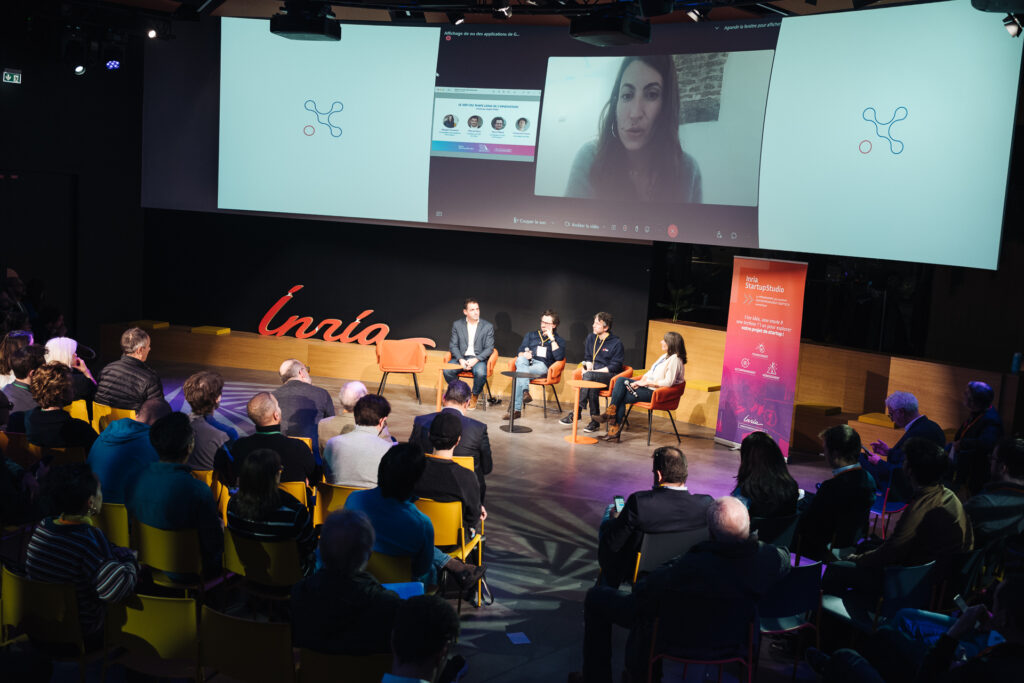
Indeed, the long term of developing an innovative offer often clashes in the short term with the search for profitability. The challenge for the entrepreneur is to align divergent interests: “You have to create a story, put steps in place and plan realistically,” indicates Pierre Fillard, joined by Emmanuel Vincent, who like him, “does not can’t see the time passing.” Like research, entrepreneurship is constant learning, with its good days and its bad days. And if being in charge makes everything more intense according to Margot Corréard, the important thing is “to find a balance, but above all to dare so as not to regret anything later!”
Clément FAGES
Publication date: 16/02/2024
Want to get started ?
